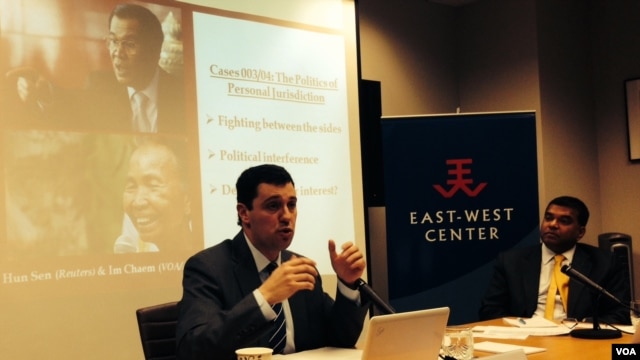Dr.
John Ciorciari, assistant professor at the University of Michigan's
Ford School of Public Policy talks at the launch of his new book "Hybrid
Justice: Trials and Errors at the Khmer Rouge Tribunal" at the
East-West Center in Washington, DC, Thursday, January 16, 2014. (Sok
Khemara/VOA Khmer)
New Book Critiques Khmer Rouge Tribunal
VOA | 18 Jan. 2014
WASHINGTON — Two authors have completed a new book on the UN-backed criminal court in Phnom Penh.
In “Hybrid Justice: Trials and Errors at the Khmer Rouge Tribunal,” John Ciorciari, a professor of public policy at the University of Michigan, and Anne Heindel, a legal advisor at the the Documentation Center of Cambodia, in Phnom Penh, say the UN-backed court has not been a shining example in international atrocities justice.
“The UN has undeniably a weak structural position in this court, but it’s still chosen to interpret its mandate narrowly, conservatively, defering in most cases to Cambodian sovereignty and prerogative,” Ciorciari told an audience at the East West Center in Washington on Thursday. “So the lesson here is that if the UN gets involved, it needs to exert ownership and stronger control.”
Among the issues challenging the court was the move toward a
supermajority judge opinion prior to investigations, which made it
difficult to pursue cases, he said. Political interference and the
application of local law also hampered the court, he said.In “Hybrid Justice: Trials and Errors at the Khmer Rouge Tribunal,” John Ciorciari, a professor of public policy at the University of Michigan, and Anne Heindel, a legal advisor at the the Documentation Center of Cambodia, in Phnom Penh, say the UN-backed court has not been a shining example in international atrocities justice.
“The UN has undeniably a weak structural position in this court, but it’s still chosen to interpret its mandate narrowly, conservatively, defering in most cases to Cambodian sovereignty and prerogative,” Ciorciari told an audience at the East West Center in Washington on Thursday. “So the lesson here is that if the UN gets involved, it needs to exert ownership and stronger control.”
Delays at the court, which has had just one successful trial since its 2006 inception, meant that some suspects and defendants died before trials were complete.
That includes defendant Ieng Sary, the former foreign minister of the regime, who died in custody.
Peter Maguire, author of “Facing Death in Cambodia,” said the hybrid mix of the court, which includes Cambodian and UN international judges and staff, was a mistake. Either the UN should have run the court, or the Cambodians, he said.
“To mix this with the Cambodian supermajority, it was the most grossly over-complicated trial structure I’ve seen in international legal history,” he said.
The court has spent more than $200 million since, only to convict Kaing Kek Iev, better known as Duch, for atrocity crimes.
A trial for Nuon Chea, the regime’s ideologue, and Khieu Samphan, its nominal head of state, is under way, with a verdict in the first phase of that trial expected later this year. Meanwhile, the court has not yet been funded for 2014 through 2015.
Ciorciari said the court should be funded as promised, no matter the outcome so far.
“If the international community gets involved and sets up an ambitious mandate for an institution like this, it has to be able to provide credible assurance that the funds will be there to do the job,” he said.



Why ECCC in Cambodia has had so many problems and obstacles from the so-called Hun Sen regime?
ReplyDeleteBecause this ECCC in Cambodia is Hanoi-US ECCC in Cambodia to cover up their own war crimes, crimes against humanity as follow:
For US crimes in Cambodia:
1. US brought war from Srok yuon into Cambodia , this kind of war had killed and caused so many Cambodian lives and caused endless suffering to Cambodian people.
2. US B 52 carpet bombed in Cambodia in 1973 and before which caused so many Cambodian lives and endless suffering. mass atrocities, mass starvation especially in the countryside.
For Yuon Hanoi:
1. K 5 plan in Cambodia in 1980s to exterminate Khmer ethnics .
2. Yuon Hanoi to annex Cambodia as they did to Lao.
3. Yuon Hanoi ( late Ho Chi Minh 's ambition ) known as Indochina Federation or also known as Vietnamization of Cambodia under the so-called Hun Sen regime.
Above are some war crimes, crimes against humanity against Cambodian people,mass atrocities committed by Hanoi and US during Indochina war that they ( Yuon Hanoi and US ) have cover up and put all on Nuon Chea and Khieu Samphan as scapegoats.